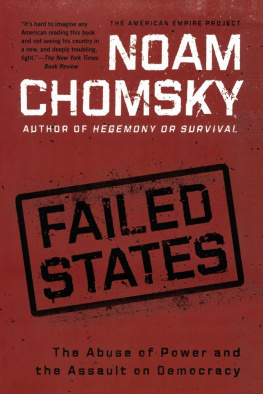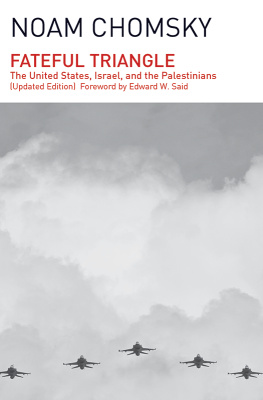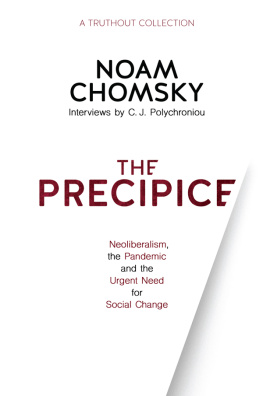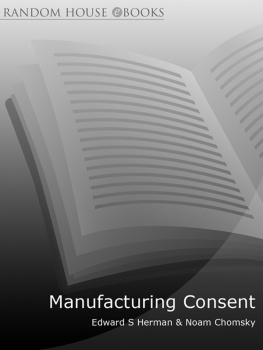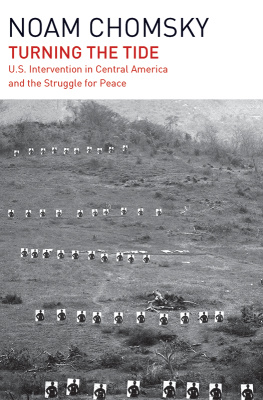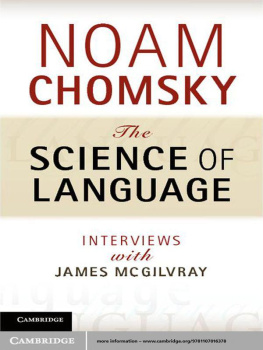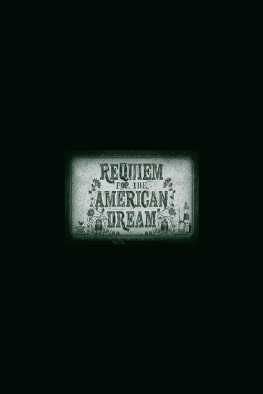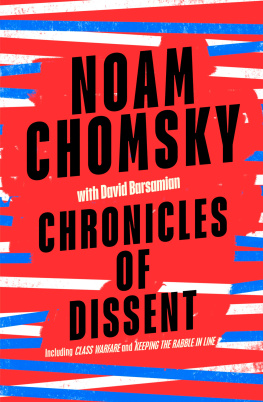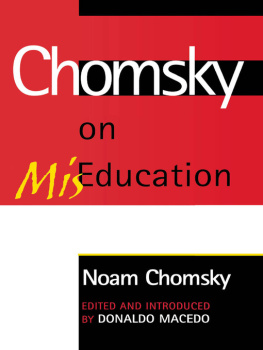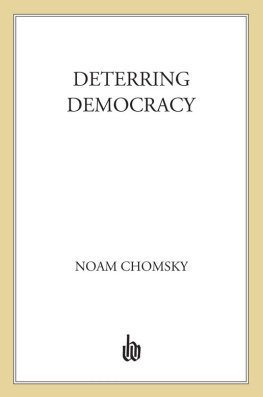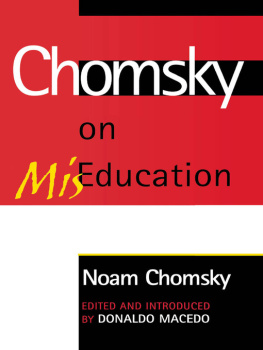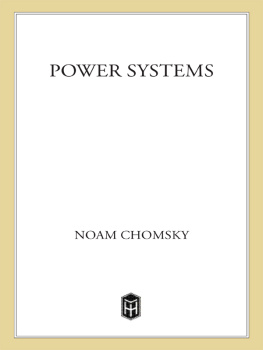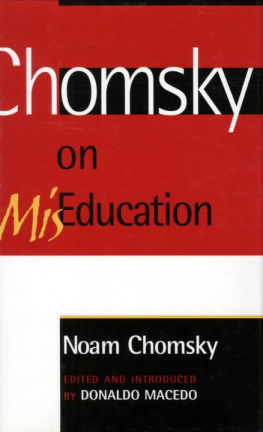
PENGUIN BOOKS
FAILED STATES
Noam Chomsky was recently named the worlds number one public intellectual in a poll by Prospect magazine. He is the author of numerous bestselling political works, including Hegemony or Survival, Imperial Ambitions, Failed States and Perilous Power, all of which are published by Penguin. He lives outside Boston, Massachusetts, and is a professor in the Department of Linguistics and Philosophy at MIT.
FAILED STATES
THE ABUSE OF POWER AND THE ASSAULT ON DEMOCRACY
NOAM CHOMSKY

PENGUIN BOOKS
PENGUIN BOOKS
Published by the Penguin Group
Penguin Books Ltd, 80 Strand, London WC2R 0RL , England
Penguin Group (USA) Inc., 375 Hudson Street, New York, New York 10014, USA
Penguin Group (Canada), 90 Eglinton Avenue East, Suite 700, Toronto, Ontario, Canada M4P 2Y3
(a division of Pearson Penguin Canada Inc.)
Penguin Ireland, 25 St Stephens Green, Dublin 2, Ireland (a division of Penguin Books Ltd)
Penguin Group (Australia), 250 Camberwell Road,
Camberwell, Victoria 3124, Australia (a division of Pearson Australia Group Pty Ltd)
Penguin Books India Pvt Ltd, 11 Community Centre, Panchsheel Park, New Delhi 110 017, India
Penguin Group (NZ), 67 Apollo Drive, Mairangi Bay, Auckland 1310, New Zealand
(a division of Pearson New Zealand Ltd)
Penguin Books (South Africa) (Pty) Ltd, 24 Sturdee Avenue,
Rosebank, Johannesburg 2196, South Africa
Penguin Books Ltd, Registered Offices: 80 Strand, London WC2R 0RL , England
www.penguin.com
First published in the United States of America by Metropolitan Books,
Henry Holt and Company, LLC 2006
First published in Great Britain by Hamish Hamilton 2006
Published in Penguin Books 2007
Copyright Harry Chomsky, as Trustee of
Chomsky Grandchildren Nominee Trust, 2006
All rights reserved
The moral right of the author has been asserted
The map on p. 180, originally published by Survival (2001) of the
International Institute of Strategic Studies, appears courtesy of
Taylor & Francis Ltd, www.tandf.co.uk/journals
Except in the United States of America, this book is sold subject to the condition that it shall not, by way of trade or otherwise, be lent, re-sold, hired out, or otherwise circulated without the publishers prior consent in any form of binding or cover other than that in which it is published and without a similar condition including this condition being imposed on the subsequent purchaser
ISBN: 978-0-14-192521-9
Contents
Preface
The selection of issues that should rank high on the agenda of concern for human welfare and rights is, naturally, a subjective matter. But there are a few choices that seem unavoidable, because they bear so directly on the prospects for decent survival. Among them are at least these three: nuclear war, environmental disaster, and the fact that the government of the worlds leading power is acting in ways that increase the likelihood of these catastrophes. It is important to stress the government, because the population, not surprisingly, does not agree. That brings up a fourth issue that should deeply concern Americans, and the world: the sharp divide between public opinion and public policy, one of the reasons for the fear, which cannot casually be put aside, that the American system as a whole is in real troublethat it is heading in a direction that spells the end of its historic values [of] equality, liberty, and meaningful democracy.
The system is coming to have some of the features of failed states, to adopt a currently fashionable notion that is conventionally applied to states regarded as potential threats to our security (like Iraq) or as needing our intervention to rescue the population from severe internal threats (like Haiti). Though the concept is recognized to be frustratingly imprecise, some of the primary characteristics of failed states can be identified. One is their inability or unwillingness to
Among the hardest tasks that anyone can undertake, and one of the most important, is to look honestly in the mirror. If we allow ourselves to do so, we should have little difficulty in finding the characteristics of failed states right at. home. That recognition of reality should be deeply troubling to those who care about their countries and future generations. Countries, plural, because of the enormous reach of US power, but also because the threats are not localized in space or time.
The first half of this book is devoted mostly to the increasing threat of destruction caused by US state power, in violation of international law, a topic of particular concern for citizens of the world dominant power, however one assesses the relevant threats. The second half is concerned primarily with democratic institutions, how they are conceived in the elite culture and how they perform in reality, both in promoting democracy abroad and shaping it at home.
The issues are closely interlinked, and arise in several contexts. In discussing them, to save excessive footnoting I will omit sources when they can easily be found in recent books of mine.
Chapter 1
Stark, Dreadful, Inescapable
Half a century ago, in July 1955, Bertrand Russell and Albert Einstein issued an extraordinary appeal to the people of the world, asking them to set aside the strong feelings they have about many issues and to consider themselves only as members of a biological species which has had a remarkable history, and whose disappearance none of us can desire. The choice facing the world is stark and dreadful and inescapable: shall we put an end to the human race; or shall mankind renounce war?
The world has not renounced war. Quite the contrary. By now, the worlds hegemonic power accords itself the right to wage war at will, under a doctrine of anticipatory self-defense with unstated bounds. International law, treaties, and rules of world order are sternly imposed on others with much self-righteous posturing, but dismissed as irrelevant for the United Statesa long-standing practice, driven to new depths by the Reagan and Bush II administrations.
Among the most elementary of moral truisms is the principle of universality: we must apply to ourselves the same standards we do to others, if not more stringent ones. It is a remarkable comment on Western intellectual culture that this principle is so often ignored and, if occasionally mentioned, condemned as outrageous. This is particularly shameful on the part of those who flaunt their Christian piety,
Relying solely on elevated rhetoric, commentators urge us to appreciate the sincerity of the professions of moral clarity and idealism by the political leadership. To take just one of innumerable examples, the well-known scholar Philip Zelikow deduces the new centrality of moral principles in the Bush administration from the administrations rhetoric and a single fact: the proposal to increase development aidto a fraction of that provided by other rich countries relative to the size of their economies.
The rhetoric is indeed impressive. I carry this commitment in my soul, the president declared in March 2002 as he created the Millennium Challenge Corporation to boost funding to combat poverty in the developing world. In 2005, the corporation erased the statement from its website after the Bush administration reduced its projected budget by billions of dollars. Its head resigned after failing to get the program moving, economist Jeffrey Sachs writes, having disbursed almost nothing of the $10 billion originally promised. Meanwhile, Bush rejected a call from Prime Minister Tony Blair to double aid to Africa, and expressed willingness to join other industrial countries in cutting unpayable African debt only if aid was correspondingly reduced, moves that amount to a death sentence for more than 6 million Africans a year who die of preventable and treatable causes, Sachs notes. When Bushs new ambassador, John Bolton, arrived at the United Nations shortly before its 2005 summit, he at once demanded the elimination of all occurrences of the phrase millennium development goals from the document that had been carefully prepared after long negotiations to deal with poverty, sexual discrimination, hunger, primary education, child mortality, maternal health, the environment and disease.
Next page
